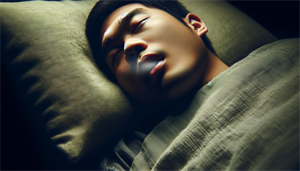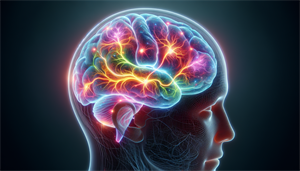Have you ever wondered about the intricate link between sleep apnea and depression? These two conditions, while seemingly disparate, share a complex, bidirectional relationship that can significantly impact one’s quality of life.
A common question that arises is, can depression cause sleep apnea? Let’s dive deeper into this intriguing interplay.
Key Takeaways
-
Sleep apnea, especially obstructive sleep apnea (OSA), is closely linked with various mental health conditions such as major depressive disorder (MDD) and anxiety, with sleep deprivation being a key factor in the bidirectional relationship.
-
Symptoms of sleep apnea and depression often overlap, including daytime sleepiness and irritability, which can complicate diagnosis and treatment, highlighting the need for professional evaluation and intervention.
-
Treating sleep apnea with methods such as CPAP therapy can have positive effects on depression, suggesting that addressing sleep issues may also aid in alleviating depressive symptoms and improving overall mental health.
The Bidirectional Relationship Between Sleep Apnea and Depression
Sleep apnea, particularly the most common type - obstructive sleep apnea (OSA), also known as obstructive sleep apnoea, is a serious condition characterized by intermittent interruptions in breathing during sleep, often referred to as sleep disordered breathing. It’s more than just a physical health issue. Emerging evidence suggests that sleep apnea, and specifically obstructive sleep apnea severity, is intricately connected with mental health conditions, including:
-
major depressive disorder (MDD)
-
anxiety disorders
-
bipolar disorder
-
post-traumatic stress disorder (PTSD)
-
attention-deficit/hyperactivity disorder (ADHD)
-
schizophrenia
The root cause of this relationship? It’s mainly due to sleep deprivation, a frequent consequence of sleep apnea. Sleep apnea and depression feed into each other in a reciprocal manner, where sleep deprivation due to sleep apnea can elevate the likelihood of developing depression and anxiety. In turn, depression can lead to deteriorated sleep quality, creating a vicious cycle.
Additionally, severe obstructive sleep apnea can independently increase the risk of depression. It’s not hard to see why - excessive daytime sleepiness, a common symptom of sleep apnea, can significantly hamper one’s daily functioning, often leading to a depressed mood and other depressive symptoms.
This intricate interplay between sleep apnea and depression is further complicated by the fact that many individuals remain undiagnosed. Many people with sleep apnea are not aware of their condition, attributing their excessive daytime sleepiness and other symptoms to stress or a busy lifestyle. The same is true for depression - many individuals with depressive symptoms do not seek help due to the stigma associated with mental health conditions.
So, it’s clear that sleep apnea and depression are more interconnected than we might assume. But to fully appreciate this connection, we need to delve deeper into the role of sleep deprivation, a common denominator between these two conditions.
The Role of Sleep Deprivation
Sleep disorders like obstructive sleep apnea syndrome often result in sleep deprivation. It’s not just about feeling tired or sleepy during the day. Chronic sleep deprivation can lead to neurochemical changes in the brain, leading to depression.
Furthermore, sleep deprivation can inflict neurological damage on the hippocampus, interfere with emotional processing, and escalate the risk of cognitive impairment. This neurological toll can further exacerbate depression symptoms, creating a vicious cycle.
The psychological repercussions of prolonged sleep deprivation are equally concerning. They range from heightened stress and anger levels to increased negative emotional responses to stressors and reduced positive emotions. These can culminate in various mental health conditions such as depression, anxiety, bipolar disorder, and others.
Common Symptoms and Overlapping Features

Considering the strong link between sleep apnea and depression, it is expected that they exhibit several shared symptoms. Some of the typical overlapping symptoms include:
-
Daytime sleepiness
-
Memory loss
-
Fatigue
-
Irritability
-
Difficulty concentrating
-
Mood swings
This overlap can make it challenging to differentiate between sleep apnea and depression and often leads to a delay in diagnosis or misdiagnosis.
Consider the case of daytime sleepiness. This symptom is prevalent among obstructive sleep apnea patients, even more so in individuals suffering from both sleep apnea and depression. This scenario is likely to lead to a cycle of poor sleep quality and depressive symptoms, further exacerbating both conditions.
Similarly, patients with both sleep apnea symptoms and depression and anxiety symptoms often experience severe fatigue. This fatigue is not just physical. It extends to mental fatigue as well, which can manifest as difficulty concentrating, irritability, and mood swings.
Also, irritability in individuals with breathing related sleep disorders like sleep apnea can manifest upon awakening in an irritable or depressed state, often stemming from sleep fragmentation or deprivation. This underscores the intricate connection between sleep and mood, and how disturbances in one can significantly impact the other.
In light of these overlapping symptoms, it’s crucial to seek professional help if you suspect that you or a loved one may be dealing with sleep apnea, depression, or both. Early intervention and appropriate treatment can significantly improve outcomes and quality of life.
The Impact of Treating Sleep Apnea on Depression

Although the two-way relationship between sleep apnea and depression might appear daunting, there is a glimmer of hope. Treating sleep apnea can have a positive impact on depression, enhancing sleep quality, life quality, and depressive symptoms in patients.
Continuous positive airway pressure (CPAP) therapy, the primary treatment option for sleep apnea, can be a game-changer here. By maintaining open airways using pressurized air, CPAP therapy prevents apnea events during sleep, improving sleep quality and reducing daytime sleepiness. This enhanced sleep quality can, in turn, lead to a reduction in the severity of depressive symptoms.
But the benefits of treating sleep apnea extend beyond just alleviating depressive symptoms. It also contributes to enhanced mental well-being by lowering the risk of depression, anxiety, and suicidal thoughts. It also facilitates better quality of sleep and increased alertness during the day.
Hence, managing sleep apnea could be a significant step towards controlling depression symptoms. However, it’s essential to remember that each individual is unique, and the treatment approach should be tailored to the individual’s specific needs and circumstances.
Risk Factors and Comorbidities
Grasping the common risk factors and coexisting conditions of sleep apnea and depression can shed more light on their intricate relationship. Obesity, smoking, and cardiovascular disease are common risk factors and comorbidities that can further complicate their relationship.
Obesity significantly increases the risk of both sleep apnea and depression, making it important to address and manage. Both conditions can have severe impacts on overall health and well-being. A notable proportion of people with sleep apnea are overweight or obese, which may also contribute to the elevated rates of depressive symptoms observed. Therefore, weight management strategies should be a key component of treatment plans for individuals suffering from both conditions.
Smoking is another shared risk factor. While it may provide temporary mood improvement due to nicotine’s stimulation of the nervous system, it also has the potential to lead to depression. Additionally, smoking can increase the prevalence of sleep apnea, further intensifying the negative impact on mental health.
Cardiovascular disease is significantly linked to sleep apnea and depression. Many cardiac patients also experience depressive disorders, which further underscores the intricate interplay between sleep apnea and depression. Thus, managing these shared risk factors and comorbidities can be instrumental in effectively treating both conditions.
Treatment Options for Sleep Apnea and Depression

Considering the complex relationship between sleep apnea and depression, a multi-faceted treatment approach could prove effective. The primary treatment options for sleep apnea are:
-
Continuous positive airway pressure (CPAP) therapy, which can significantly improve sleep quality and reduce depressive symptoms
-
Oral appliances, which can help keep the airway open during sleep
-
Surgery, which may be recommended in severe cases
By addressing both sleep apnea and depression, individuals may experience improved overall well-being and quality of life.
However, it’s not just about treating sleep apnea. Addressing depression is equally important. For individuals grappling with both obstructive sleep apnea (OSA) and major depressive disorder (MDD), a multi-pronged approach that combines:
-
CPAP therapy
-
Lifestyle changes
-
Psychotherapy
-
Medication
can effectively manage both conditions.
Let’s further explore these treatment strategies and their potential to effectively manage both sleep apnea and depression.
Lifestyle Changes to Manage Both Conditions
In managing both sleep apnea and depression, lifestyle changes can be incredibly impactful. Weight loss, regular exercise, and stress management are effective strategies that can significantly improve both conditions.
Weight loss, in particular, holds great importance in the treatment of both sleep apnea and depression, as it has the potential to decrease the severity of both conditions. Regular exercise can also contribute to weight loss and improve mental health by reducing stress and enhancing mood.
Stress management techniques, including relaxation techniques and meditation, can also enhance sleep quality and aid in managing mental health. Lastly, a balanced diet can have a positive influence on both conditions, potentially mitigating associated conditions such as cardiovascular disease.
Medication and Therapy for Depression in Sleep Apnea Patients
Besides lifestyle alterations, medication and therapy can also significantly contribute to managing depression in sleep apnea patients. Some appropriate antidepressants for individuals with comorbid sleep apnea and depression include:
-
Mirtazapine
-
Trazodone
-
Armodafinil
-
Modafinil
However, caution should be exercised with sedating medications like tricyclic antidepressants.
Psychotherapy, particularly cognitive behavioral therapy (CBT), can also be beneficial. By addressing negative thoughts and modifying behaviors that can worsen depression, CBT can help manage depression in sleep apnea patients.
Other therapeutic strategies like interpersonal psychotherapy and psychodynamic therapy have also shown effectiveness in managing depression in patients with sleep apnea. Thus, a combination of lifestyle changes, medication, and therapy can provide a comprehensive treatment approach for individuals grappling with both sleep apnea and depression.
Seeking Help: Mental Health Resources

Identifying the symptoms of sleep apnea and depression marks the initial step in seeking help. If you or a loved one is experiencing symptoms of either or both of these conditions, it’s crucial to reach out to healthcare professionals for help. Early intervention and treatment can significantly improve your quality of life.
If you’re experiencing suicidal thoughts, don’t hesitate to dial 988 to connect with the 988 Suicide & Crisis Lifeline and speak with a trained counselor for immediate support. Remember, there’s always help available, and you’re not alone.
For additional support, you can reach out to SAMHSA’s National Helpline at 1-800-662-HELP or the 988 Mental Health Emergency Hotline. The National Helpline Database also offers a range of support options for mental health.
Online forums and platforms that offer community support for individuals with sleep apnea and depression include:
-
CPAP Talk
-
Brigham Health: MyApnea Forum
-
Apnea Board
-
Sleep Apnea Forums
These platforms provide opportunities to exchange experiences, learn from others, and feel part of a supportive community.
Remember, seeking help is a sign of strength, not weakness. Don’t hesitate to reach out if you need support.
Summary
Sleep apnea and depression share a complex, bidirectional relationship that can significantly impact one’s quality of life. Their shared symptoms, risk factors, and comorbidities further complicate their relationship, making it crucial to understand their interplay and seek professional help if you suspect you or a loved one may be dealing with these conditions.
Effective management of both conditions requires a multi-pronged approach, combining lifestyle changes, medication, and therapy. Remember, early intervention and treatment can significantly improve outcomes and quality of life. You’re not alone in this journey, and help is always available.
Frequently Asked Questions
Can mental health issues cause sleep apnea?
Yes, mental health issues can cause sleep apnea, as individuals with schizophrenia are 6 times more likely to have sleep apnea, and there are shared symptoms with depression like daytime drowsiness and mood swings.
How long will it take to reverse damage from sleep apnea?
Treating sleep apnea with CPAP for 12 months can almost entirely reverse damage done to white matter, improving sleep and symptoms while decreasing the risk for cognitive issues.
How many years does untreated sleep apnea take off your life?
Untreated obstructive sleep apnea can shorten your life by 12-15 years, but timely diagnosis and treatment can alleviate its effects and prevent life shortening.
Can sleep apnea lead to depression?
Yes, sleep apnea can increase the likelihood of experiencing depression and anxiety symptoms due to the sleep deprivation it causes. It's important to seek treatment for both conditions to improve overall well-being.
What are common symptoms of sleep apnea and depression?
Common symptoms of sleep apnea include daytime sleepiness, memory loss, fatigue, irritability, difficulty concentrating, and mood swings, which can also be indicative of depression. Both conditions may share similar symptoms.


